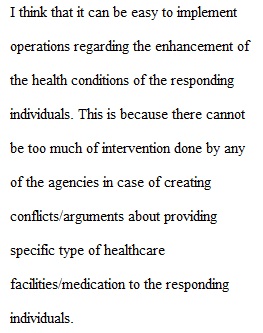


Q Read the RAND Corporation report: “Protecting Emergency Responders: Safety Management in Disaster and Terrorism Response.” http://www.rand.org/content/dam/rand/pubs/monographs/2004/RAND_MG170.sum.pdf (Summary); http://www.rand.org/content/dam/rand/pubs/monographs/2004/RAND_MG170.pdf (Full Report) After reviewing this report, answer the following questions: What elements of RAND’s recommendations do you believe are the easiest to implement? The most difficult? Do you agree with RAND’s overall assessment of the bioterrorism threat? Your response should be at least 4 paragraphs. Respond to at least three of your colleagues in each of the discussion board areas. Be sure to respond to your colleagues’ responses. Review the Senate’s report on the March 1995 attack on the Tokyo subway system. To what degree do you believe that a similar catastrophe might occur in the United States? Are we any more or less equipped than the Japanese government in thwarting the biological terrorist goals of domestic or international terrorist groups?
View Related Questions